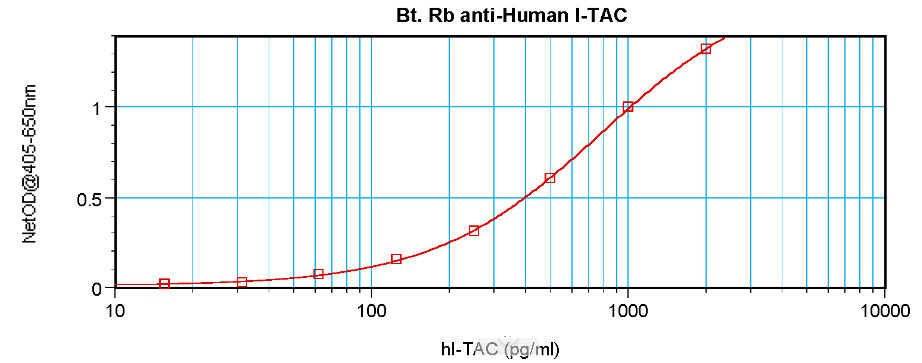CXCL11 Rabbit Polyclonal Antibody
Specifications
| Product Data | |
| Applications | ELISA, WB |
| Recommended Dilution | Direct ELISA: To detect Human I-TAC by Direct ELISA (using 100 µl/well antibody solution) a concentration of ~1.0 µg/ml of this antibody is required. This Biotin conjugated antibody allows the detection of at least 2000-4000 pg/ml of recombinant Human I-TAC. Sandwich ELISA: To detect Human I-TAC by Sandwich ELISA (using 100 µl/well antibody solution) a concentration of 0.25-1.0 µg/ml of this antibody is required. This Biotin conjugated antibody in conjuction with Purified anti-Human I-TAC (Cat.-No PP1091P) as a Capture antibody, allows the detection at least 2000-4000 pg/ml of recombinant Human I-TAC. Western Blot: To detect Human I-TAC by Western Blot analysis this antibody can be used at a concentration of 0.1-0.2 µg/ml. Used in conjunction with compatible secondary reagents the detection limit for recombinant Human I-TAC is 1.5-3.0 ng/lane, under either reducing or non-reducing conditions. |
| Reactivities | Human |
| Host | Rabbit |
| Clonality | Polyclonal |
| Immunogen | Highly pure (>98%) E.coli-derived 8.3 kDa recombinant Human I-TAC. |
| Specificity | Recogbizes Human I-TAC. Other species not tested. |
| Formulation | PBS, pH 7.2 without preservatives Label: Biotin State: Lyophilized purified Ig fraction |
| Reconstitution Method | Restore in sterile PBS containing 0.1% BSA to a concentration of 0.1-1.0 mg/ml. |
| Purification | Affinity Chromatography |
| Conjugation | Biotin |
| Storage | Store lyophilized at 2-8°C for 6 months or at -20°C long term. After reconstitution store the antibody undiluted at 2-8°C for one month or (in aliquots) at -20°C long term. Avoid repeated freezing and thawing. |
| Stability | Shelf life: one year from despatch. |
| Database Link | |
| Background | This member of the the intercrine alpha (chemokine CxC) family is chemotactive for interleukin-activated T cells but not unstimulated T cells, neutrophils or monocytes. It induces calcium release in activated T cells and binds to CXCR3. It may play an important role in CNS diseases which involve T cell recruitment and in skin immune responses. It is expressed at high levels in peripheral blood leukocytes, pancreas and liver astrocytes and at moderate levels in thymus, spleen and lung. It is induced by interferon gamma and interferon beta. |
| Synonyms | C-X-C motif chemokine 11, Small-inducible cytokine B11, H174, Beta-R1, IP-9, I-TAC, SCYB11, SCYB9B |
| Note | Centrifuge vial prior to opening! |
| Reference Data | |
Documents
| Product Manuals |
| FAQs |
{0} Product Review(s)
0 Product Review(s)
Submit review
Be the first one to submit a review
Product Citations
*Delivery time may vary from web posted schedule. Occasional delays may occur due to unforeseen
complexities in the preparation of your product. International customers may expect an additional 1-2 weeks
in shipping.






























































































































































































































































 Germany
Germany
 Japan
Japan
 United Kingdom
United Kingdom
 China
China




